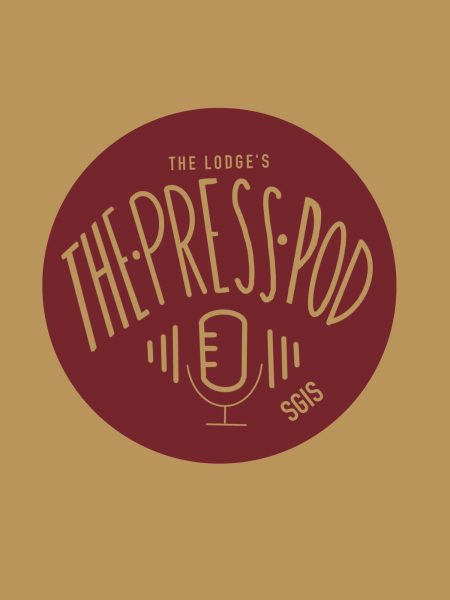Money on their minds
Cutco promises big bucks for students. Do they deliver?
When listening to senior Noah Pope speak about Cutco, one could be forgiven if for thinking he was describing Stratton Oakmont from “The Wolf of Wall Street.”
“If you walk into a Cutco meeting and you’re sitting there, there’s tons of screaming, tons of cheering loud. It’s controlled chaos,” Pope said.
Like Stratton Oakmont, Cutco can sound like a nonstop fraternity party: men are screaming exclamations of joy and motivation, the atmosphere is loud and chaotic, and they all have money on their mind.
The young men who work at Cutco are motivated by the over-the-top shenanigans that encourage them to reach their monetary goals, from cash giveaways to literally breaking through boards that represent obstacles.
“You write your goal on the board and under it you write what’s going to stop you from getting that goal on the board, and you have to break the board basically,” Pope said. “There are people breaking it with their heads, breaking it with hammers, like you’re breaking through the things that are going to stop [you] from getting your goal.”
Pope, who plays varsity football and is Prefect of Connections this year, has been working at Cutco since 2015 when he was called during the summer and found out the job started at $18 an hour.
He had never heard of Cutco before, but he went in for the interview looking to make some money. Two years later, Pope is at 40 percent commission, has become a well-known name around the St. George’s-Cutco sphere and even considered working as a district manager this summer.
A knife-selling giant Cutco now has over 200 offices across the United States, Canada and Puerto Rico and over 60,000 employees working annually, most of whom are high school or college students. Within the St. George’s community, over 18 current students have worked for Cutco, 10 of whom worked there for less than a month.
Later on, many of those 10 students would go on to claim the business was a scam or a pyramid scheme.
Vector Marketing is the parent company that sells Cutco products and hires new employees, and those who are recruited are tasked with selling the product, which is primarily knives but also includes an assortment of other kitchen utensils. When new employees are recruited, they practice the one-hour demo on their friends and family, and at the end of those appointments, they are given referrals of people who may be interested in buying Cutco.
“It gets you really comfortable and is a really great way to first start out because then you get into the rhythm of making phone calls [and] making demos,” sophomore Austin Wall said. “Because it’s friends and family, you can ask for feedback, and you’re comfortable getting sometimes negative feedback, sometimes positive.”
The more students sell at Cutco, the higher their commission rate is. All new employees start at 10 percent commission, meaning they would make $100 off a $1,000 sale. Selling $1,000 brings you to 15 percent, $3,000 to 20 percent, $6,000 to 25 percent, $10,000 to 30 percent, and the commission can go as high as 50 percent if you become an assistant manager.
The Cash
For almost all students who pursue jobs at Cutco, their motivation is simple: it pays well.
“My friends are talking about their summer jobs, and they’re like, ‘Yeah, every week I make 400 dollars.’ And I’m like, ‘Yeah, I made 400 dollars just going to one person,’” Pope said. The most Pope ever made in a week was about $2,800, and he worked so much his first summer that he started making more money than his mom.
Like Pope, senior Alex Middleton has been working at Cutco since the summer of 2015, needing the money to pay for gas, food and going out with his girlfriend. However, Middleton said that the money isn’t immediate and only comes from working hard.
“It’s not a job where you go in and quickly make a ton of money. You have to work really hard to make money in it,” Middleton said. “How much you put into it is how much you get out of it.”
When someone starts working at Cutco, they are asked to give numbers of their friends who they think would be interested in working at Cutco, and these are the people who Cutco reaches it out to via phone calls and text messages.
Sophomore Austin Wall took an interest in Cutco after Middleton referred him to the job. His motivations included wanting to save up for the spring break trip to Europe and to put the unique job experience on his resume. However, after starting work this July, he soon began to appreciate Cutco’s flexibility with his busy schedule.
“Because I am active in sports, I am active in the band at church, I am active with friends … they allow you to kind of make your own work hours,” Wall said. “It really helps [active students] out because not only are they making a good amount of money, but it also gives them the freedom to schedule around things they have going on in their life.”
The Conflict
On the other side of the spectrum are the St. George’s students and faculty who worked at Cutco for as little as one day, many of whom cited issues ranging from not feeling extroverted enough to feeling harassed by management.
Eleventh-grade biology teacher Mr. Sam Abrams worked at Cutco for one day in college before he realized that it wasn’t for him.
“If I wanted a job, I wanted an actual job and not one that necessitates that I call all these people that I don’t know and make these appointments with people I don’t know and push something that I don’t really care about,” Mr. Abrams said. “You definitely need to have those people skills and not really care about strangers shooting you down, which at the time that was a huge phobia of mine.”
For others who have worked at Cutco, they feel they had difficulty selling when Middleton and Pope, who began selling to a new group of the St. George’s community last summer, had already sold to many families.
“90 percent of the people I called who were friends with my parents or family already had Cutco, and about seven out of 10 of the people I would call would say, ‘I already have Cutco — I don’t really need any more. Thanks though,’” junior Steven Smith, who currently works at Cutco, said. “It’s really hard and frustrating to be successful.”
Although some people can sell Cutco to a customer multiple times, like Pope, others cited discomfort at coming off pushy, meaning most Cutco sales are one-time sales.
“Everyone already has Cutco, and everyone who doesn’t has already been called by like 50 people,” senior Austin Skinner said. He stated that he received about four texts and eight calls from Cutco asking him if he wanted a job, all of which he denied.
Although being successful in the field was difficult for some, the workplace difficult can also pose as a challenge for those who don’t fit in. As many current Cutco employees described the job as “high school guys selling knives,” one can see how high school girls may not find the community as inviting.
“Everyone above you is a man and then even people who are somewhat above you are men,” senior Faith Huff, who worked for Cutco for three weeks, said. “It was kind of sexist.”
After working at Cutco for three weeks this past summer, senior Devon Johnson quit his job, citing harassment issues from managers and calling Cutco “the biggest lie in the world.”
“They were harassing me. I didn’t like it,” Johnson said. “They kept forcing me to go to meetings, [and] I didn’t want to go to meetings. They called me every morning at 9 o’clock asking me how many appointments I had set up, and I did not like that.”
After he quit, Johnson began to build a lawsuit against Cutco, wanting to accuse them of harassment and not paying him his $18.
“Every time you have an appointment you get paid that $18 regardless, so I didn’t get paid that,” Johnson said. Johnson was also frustrated with the way that Cutco continued to send text messages to his friends, whose numbers Johnson gave to Cutco when he was first hired, and told them that they had just hired Johnson after he quit. He did not go through with the lawsuit and now works at Pyro’s Fire Fresh Pizza.
The Controversy
Although Cutco has become well-known within the St. George’s community, it is also infamously known among students for its incessant calls and texts for job recruitment.
According to an email survey sent to upper school students, out of 91 respondents, 72 students, or more than 75 percent, have received a call or text asking if they were interested in working for Cutco. Among those students, about 45 percent were called or texted four or more times.
Junior Anna Harbert said that she received 15 calls in one week from the same person after she was recommended by one of her friends. “They kept on calling me and calling me, so I eventually had to tell them I didn’t want a job, but they still wouldn’t stop calling me,” Harbert said. “Sometimes I feel like it’s a scam, and the knives may not be as good as they seem to be. It’s just odd, and it seems kind of like telemarketers.”
Likewise, senior Grace Optican, whose boyfriend and brother both worked for Cutco, admits the calls gave her anxiety because she was afraid to tell them she didn’t want a job.
“One time I was so nervous about get- ting a call from them that, because I don’t like telling people ‘no,’ I was like, ‘Can you call me back?’ So then I gave them my number and then I hung up and blocked their number so, when they called back, it just wouldn’t go through,” Optican said. “I really get uncomfortable telling people ‘no.’”
However, Pope doesn’t view the calls as negatively as others may because it was through a recruitment call that he learned about Cutco.
“I guess the calls do get annoying, but what if they didn’t do those calls?” Pope said. “Then people like me wouldn’t get the job.”
These constant calls to recruit new employees have led many, both locally and nationally, to accuse Cutco of being a scam and a pyramid scheme.
“They’re really shady,” senior Robert Grissom said, who was called four times and texted twice about working for Cutco. “Some things they do I would consider a scam, like how they pay their people.”
Similar to a pyramid scheme, Cutco benefits from recruiting more members because the newest employees only make 10 percent commission, meaning Cutco and Vector Marketing profit the most off their newest members, many of whom quit before they can increase their commission rate to a significant amount.
Additionally, current Cutco workers can receive incentives if they recruit their friends and that friend sells $1,000 after getting the job. According to Middleton, you can win a Yeti cup for recruiting one person, custom Costa or Rayband sunglasses for recruiting three, and even winning a one-person ticket for a cruise if you recruit 10.
“That’s why people get calls constantly. It’s high school guys, [and] they want free Yetis, free sunglasses, one of them is 100 bucks cash,” Middleton said. “They want that — why not bug your friends for it?”
While Cutco is generous to its employees with gifts when certain goals are reached, they are also known for paying employees well who work hard. In the case of Pope, the job was so lucrative that he began to buy things just because he could.
“I like buying pointless material things, like I’m really big into watches. I’ve probably spent $2,000 on watches,” Pope said. “I was making so much money at Cutco that, in between appointments, I would go to the mall just because I was bored, and I was like, ‘Well, I guess I’ll buy a new outfit for my next appointment.’”
Cutco can be unbelievably rewarding for students who work hard to sell, leaving those employees with higher commissions or those who serve as managers with so much money they don’t know what to do with it. But, with an average net sales of $200 million annually, it may be that the biggest winner of all in this equation is Cutco.











